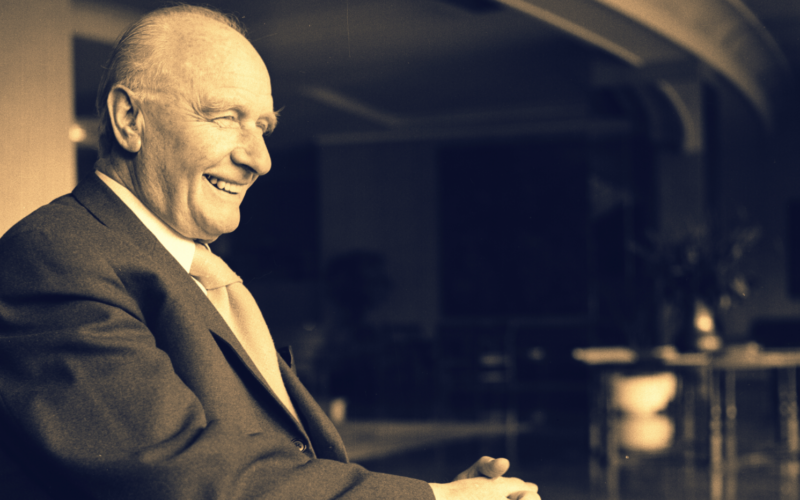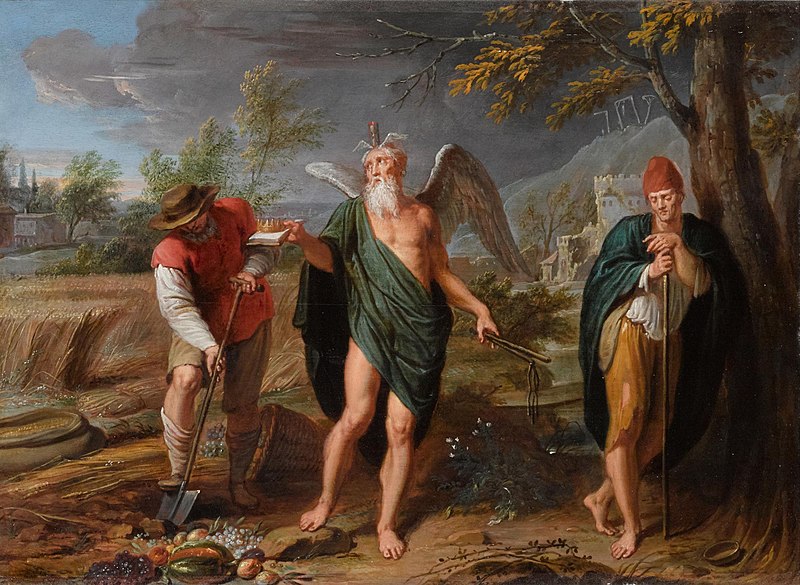I’m 25 years old and I graduated two years ago. Currently, I’m working and earning money. Many of my peers have also started their careers or continued their studies. That is what we are expected to do. We have to work from 9-5, 5 days a week, recharge on the weekends, and do it again. Work is a very dominant force in our lives. It not only dominates our schedules but also a large part of our identity. And I think that kinda sucks. Because work is about control and hierarchy, it is in many forms the opposite of freedom. That’s why, in this series of essays, I am investing what the alternatives/opposites to work are. What does it mean to work and what does it mean to leisure? Questions like that.
I’ve written an article on the great Roman orator and politician Cicero’s vision on leisure and I’ve also zoomed in on the ancient Japanese monk Kenko’s vision on idleness. And today I’ll be discussing the viewpoint of the 20th-century Catholic, German philosopher Josef Pieper. This article will mostly draw from his essay/book ‘Leisure: The Basis of Culture’.

The first notion of leisure that we find in this book is the classic notion: leisure is what we “do” when all else—politics, economics, daily duties—is done. Just like we saw with Cicero, we see leisure being broken down to the opposite of work. Again, we notice that the Greek a-scolia and the Latin neg-otium are being dragged out of the closet to explain that in ancient times work was defined as time in which ‘we are unleisurely, in order to have leisure.’ (It is important to note that this definition tells us that you work in order to leisure, not the other way around, like how it seems to be in our current society).
And just like we learned from studying Cicero’s thoughts, we find that Pieper does not simply accept leisure to be merely the absence of work. It is more than that. We learned from Cicero that there is a difference between dignified leisure and undignified leisure. He taught us how to ‘rest with dignity’, cum dignitate otium. But where Cicero always stays at a rather superficial level by just simply prescribing some dignified activities that may be undertaken during leisure (oh, how practical the Romans were), Pieper prefers to look at it in a more philosophical way.
The mental and spiritual attitude of leisure
Leisure is not just the absence of work. It’s not just resting, going on a holiday, or chilling during the weekend. Ignoring these simplified signifiers, Pieper argues that leisure must be understood as a mental and spiritual attitude.
To illustrate this, we have to look at an alternative to leisure, which is idleness. Both can take place in the absence of work, which makes many people think that idleness and leisure are somewhat similar. But Pieper shows that idleness is actually closer to being the opposite of leisure. He describes it as ‘being the inner prerequisite that renders leisure impossible’. Idleness is the opposite of leisure, in the sense that idleness represents acedia: a certain restlessness that is being caused by the refusal to give consent to your own will and your own being. We can therefore see how idleness and leisure are polar opposites to each other, because to leisure means to be one with yourself and to acquiesce to your own being.

So you can’t just stop working, sit on your lazy ass and call it ‘leisure’. You have to be able to be ‘one with yourself’. These kinds of talks about ‘oneness’ and ‘being one with yourself’ sound vaguely Buddhistic to me. And it’s true that we can find similar themes in Kenko’s descriptions of idleness. He describes the importance of being able to cut yourself loose from all earthly desires and influences and to be able to be truly alone and to be one with yourself.
To leisure is to wonder
Now that we’ve established the basic mental and spiritual foundation of what it is to leisure, we can start digging a little deeper. So we need to be ‘one with ourselves’ in order to leisure, but what do we do after that? We just sit there and be ‘one with ourselves’? No. Because sitting alone in freedom is a great gift to us. We must not waste it. Pieper describes this gift to us as a certain silence. A silence in which we are able to apprehend reality. ‘Only the silent hear and those who do not remain silent do not hear.’ Pieper states that this silence means that ‘the soul’s power to “answer” to the reality of the world is left undisturbed’. It allows us to sit still and observe the world. To wonder about the world’s mysteries. This last notion is important to Pieper, because this is where he lays the connection with his Catholic beliefs. I’ll come back to that at the end of this article.
Leisure and liberal arts: the basis of culture
To be human is to wonder. And under the right influences, such as the ones we find in leisure, we can wonder. It’s that sense of wonder that makes ‘leisure the basis of culture’ (the title of Pieper’s book). Because in leisure, being away from the realm of work, whilst being one with yourself, you have the freedom to wonder. And to wonder is a wonderful thing. Because wondering has the same architecture as hoping, or philosophizing, says Pieper. It’s acknowledging that we are nothing yet, but we are becoming something. It plays with the same feelings of the sublime, of being in awe of something incomprehensible and wanting to be close to it.
This sense of wonder is also a prerequisite for all of the liberal arts, something Pieper writes about quite a bit as well, because these liberal arts are what create culture. He uses Aquinas’s definition of liberal arts: “Only those arts are called liberal or free which are concerned with knowledge; those which are concerned with utilitarian ends that are attained through activity, however, are called servile.” Liberal arts are all forms of human activity that are being engaged with for the sake of the activity itself. They are an end in themselves, instead of the servile activities which are means to utilitarian ends.

He then goes and shows us that during the Middle Ages sloth and restlessness, ‘leisurelessness’, the incapacity to enjoy leisure, were all closely connected. Sloth was held to be the source of restlessness and the ultimate cause of “work for work’s sake”. This kind of ties everything nicely together because we can recognise this restlessness as the same restlessness that is the foundation of idleness. The basis of that restlessness was acedia, to be not one with yourself. So people that work for work’s sake, do that out of a sense of restlessness. They are not able to leisure, because they are not one with themselves.
Workaholics are proletarians
It’s those kinds of people that Pieper calls ‘proletarians’. Their life is completely filled with work and their life has shrunk inwardly, with the result that they can no longer act significantly outside their work, and perhaps can no longer even conceive of such a thing. I thought that was an interesting link. I like that these anti-capitalist ideas are being linked to religion because most of the critiques on capitalism that I’ve heard so far come from secular ideologies. But here Pieper shows a refreshing perspective. He says that it’s not crazy to see so many people becoming absorbed with work and their job, simply because they do not have anything else to find satisfaction in. They are spiritually impoverished, one-track-minded and they have created the illusion of a life fulfilled because that’s what the world of total work does to you. They lack the sense of wonder, the hope, and the sparkle of mystery that is so closely tied to leisure.
The mystery of Catholicism
And this is also where the link with his Catholic beliefs comes into play because to be Catholic is to be drawn to the mystery of the religion. Just the same as wonder, the Catholic religion revolves around the mystery. It doesn’t proclaim to have all the answers. On the contrary, it accepts that the truths of reason are generally inconceivable and that the truths of Christianity ‘in spite of being revealed, remain hidden.’ Personally, I think that is wonderful. It’s that aspect of Catholicism that draws me in as well. There are many more interesting aspects that can be found in Josef Pieper’s ‘Leisure: The Basis of Culture’, but I think that everything above should be enough to get a grasp of how Pieper thought about leisure. I thought it was mighty interesting and I learned a lot. And I hope you did as well 🙂